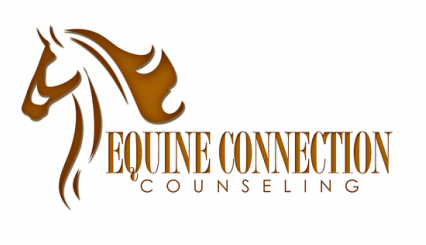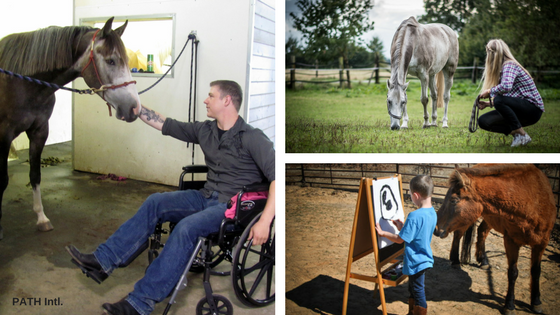But what is “Equine Therapy”? Equine therapy is an umbrella term that refers to a myriad of different kinds of services involving horses and healing – all of the services are therapeutic and impart benefits to their participants. However, only certain types of services qualify as actual therapy (and require a licensed professional) according to the Professional Association of Therapeutic Horsemanship (PATH) International. Whether you are a client (or potential client), volunteer, or professional, it is important to be aware of what is actually out there, who does it, and what questions to ask. Being armed with this information will help you to be able to make an educated decision regarding which type of service is right for you.
PATH Intl. designates “equine therapy” services into two main categories: equine-assisted activities and equine-assisted therapies. The determination as to whether a service is classified as an activity or a therapy depends on the credentials of the provider and the overall goals of the intervention. Read on to learn more about PATH Intl.’s definitions for each kind of service.
Equine-Assisted Activities: Equine-assisted activities do not require the participation of a licensed professional. Equine assisted activities include therapeutic riding, mounted or ground activities, grooming and stable management, shows, parades, demonstrations, etc., in which the center’s clients, participants, volunteers, instructors, and equines are involved. One of the most common forms of equine-assisted activities, therapeutic riding, is defined by PATH Intl. as an activity intended to contribute positively to the cognitive, physical, emotional and social well-being of individuals with special needs. As mentioned above, facilitators are not required to be licensed professionals but rather are typically PATH Intl. certified riding instructors. According to PATH Intl., instructors are trained to conduct a safe, basic equestrian lesson to individuals with special needs.
Equine-Assisted Therapies: Equine-assisted therapies do require a licensed professional. Equine-assisted therapy is a form of treatment focused on rehabilitative goals related to the patient’s needs and the licensed professional’s standards of practice. Hippotherapy and equine-facilitated psychotherapy are the two forms of equine-assisted therapy recognized by PATH Intl..
Hippotherapy is a form of physical, occupational or speech therapy treatment that utilizes equine movement and requires the participation of a licensed physical therapist, occupational therapist, or speech/language pathologist to address impairments, functional limitations and disabilities in patients with neuromotor and sensory dysfunction. To learn more about hippotherapy or to find a provider, visit The American Hippotherapy Association, Inc.
Equine-facilitated psychotherapy (aka equine assisted counseling/psychotherapy) is an interactive process to address psychotherapy goals set forth by the licensed mental health professional and client. The licensed mental health professional works with or as an appropriately credentialed equine professional. Here at ECC, we specialize in providing this service and are exclusively devoted to providing professional mental health care.
Curious to learn more about provider credentials and how to become and/or find a certified professional? We whole-heartedly endorse PATH Intl.’s certification programs – in fact all of our staff are PATH Intl. certified professionals! Learn more about the differences between certification and licensing here.
Confused? Want to know more? Don’t hesitate to reach out to us at Equine Connection Counseling! We would be happy answer questions and help connect you with the right service for you whether that is with us or with one of our community partners.
Dr. Hallie Sheade is a Licensed Professional Counselor and through her practice, Equine Connection Counseling, has conducted over 4,500 equine assisted counseling sessions. She is a PATH Intl. certified Registered Therapeutic Riding Instructor and a certified Equine Specialist in Mental Health and Learning (ESMHL). Dr. Hallie is actively involved with PATH Intl. as a Faculty Candidate for ESMHL training and workshops and a committee member on PATH Intl.’s Health and Education Advisory Committee. She is devoted to furthering the field and has served as invited panelist for PATH Intl. conferences and been selected to give eight peer-reviewed PATH Intl. conference presentations.


 RSS Feed
RSS Feed
